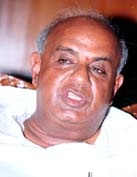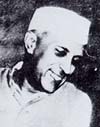|
Fifty years of freedom: What is there to celebrate?
Mani Shankar Aiyar
 Last week I was introduced to an IAS officer who has just been
transferred to Delhi to take on the most impossible assignment
the Deve Gowda government has on offer. He has been asked to
organise the celebrations of the 50th anniversary of our freedom.
The fact that one quarter of the Golden Jubliee year has elapsed
even before he has been given a desk and a telephone is the least
of his difficulties: How, in the few months that remain, is he
going to give a zing to a celebration that has so few takers?
Last week I was introduced to an IAS officer who has just been
transferred to Delhi to take on the most impossible assignment
the Deve Gowda government has on offer. He has been asked to
organise the celebrations of the 50th anniversary of our freedom.
The fact that one quarter of the Golden Jubliee year has elapsed
even before he has been given a desk and a telephone is the least
of his difficulties: How, in the few months that remain, is he
going to give a zing to a celebration that has so few takers?
I was all of six years old when freedom came at midnight. At six,
one has to be in bed by eight. But because only the world was
required to sleep while India awoke to life and freedom, my mother
took me round to join the crowd outside Parliament House for that
magic moment when an age ended and the soul of nation long suppressed
found utterance. It is one of my earliest memories, dimly remembered
but invested in retrospect with pride at having been present at
the creation.
I was 16 when we rang in the tenth anniversary of our Independence.
Bliss was it in that dawn to be alive, and to be young were very
Heaven. For in 1957, India, it seemed, could do no wrong. We
had proved through two general elections that we were a stable
democracy, the greatest democracy in the world, a nation that
had translated independence for the country into freedom for her
people, pioneer of the revolutionary concept that full-fledged
adult franchise, affirmative action, human rights, civic rights
and the rule of law should be the preconditions, not just the
consequence of development.
 Our path of planned development was accepted as the only path
that any underdeveloped country could take to eradicating poverty.
Economists the world over vied with each other to be invited to
Yojana Bhavan as the ultimate invitation to actually contributing
to -- instead of merely writing about -- the welfare of humankind.
Our path of planned development was accepted as the only path
that any underdeveloped country could take to eradicating poverty.
Economists the world over vied with each other to be invited to
Yojana Bhavan as the ultimate invitation to actually contributing
to -- instead of merely writing about -- the welfare of humankind.
The Balwantrai Mehta Report was just out; power to the people
through Panchayati Raj and community development was at the very
top of the domestic agenda. Notwithstanding our non-alignment being
a minority voice in the international community, Jawaharlal Nehru
bestrode the world like a colossus and, however irritated with
our posturings the West might be, the world turned to us for solutions
-- in Korea, Indo-China, Suez. And at the United Nations, Krishna
Menon had done us proud.
Perhaps most important of all, the travails of Partition were
behind us; there had hardly been a communal riot in the last five
years. A nationhood built on the principle of the Freedom Movement
was in the making. There was cause for celebration. The nation
did not need a joint secretary to organise the celebration. The
celebration was spontaneous. It was national.
I was 31 when we came to the 25th anniversary of our Independence:
1972. The trauma of 1962 had been put behind us. Pakistan had
been smashed in two. Unconditional surrender. Nearly one hundred thousand
prisoners of war. A new nation born. Joy Bangla! Atal Behari Vajpayee
had described Indira Gandhi as Durga.
 I had been named secretary
to the committee headed by Sukhamoy Chakravarty that took charge
of financing the return of the refuges to Bangladesh, rehabilitating
its shattered economy, rushing urgently required essential supplies,
and building new economic ties with the child of our creation:
a personal celebration of 25 years of freedom. Weeks before
August 15, 1972, the Shimla Agreement was signed, the most generous
and statesmanlike development in India-Pakistan relations since
Partition.
I had been named secretary
to the committee headed by Sukhamoy Chakravarty that took charge
of financing the return of the refuges to Bangladesh, rehabilitating
its shattered economy, rushing urgently required essential supplies,
and building new economic ties with the child of our creation:
a personal celebration of 25 years of freedom. Weeks before
August 15, 1972, the Shimla Agreement was signed, the most generous
and statesmanlike development in India-Pakistan relations since
Partition.
|

